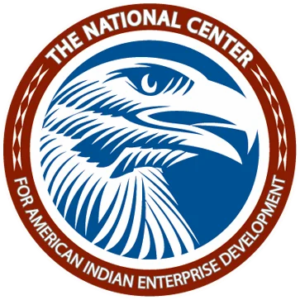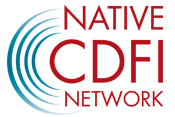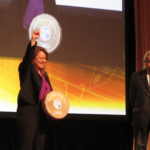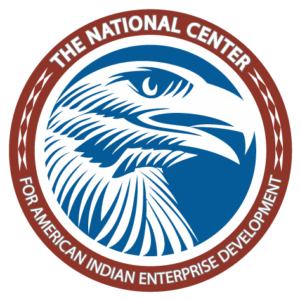


April 8, 2021
| The Honorable Nancy Pelosi
Speaker |
The Honorable Kevin McCarthy Minority Leader
|
| The Honorable Charles Schumer
Majority Leader |
The Honorable Mitch McConnell
Minority Leader |
Re: Buy Indian Expansion Proposals
Dear House and Senate Leaders:
As Congress considers major infrastructure development legislative proposals, the undersigned national organizations – that collectively serve thousands of Indian tribes, Alaska Native corporations, tribal enterprises and other Native-owned businesses — urge you to include provisions that will expand several “Buy Indian” authorities to accelerate Indian Country’s urgent infrastructure, capital access and workforce development needs. Greater use of Buy Indian tools can, and should, increase opportunities for tribal enterprises and other Native businesses to pursue award of federal contracts and subcontracts for infrastructure-related development, including transportation, water, power, cyber defense, telecommunications and broadband deployment, and housing, school and health facilities construction, and other economic development projects.
1. Buy Indian Act Expansion
Congress enacted the Buy Indian provision in 1910 (Section 23 of the Synder Act, 25 U.S.C. 47) to enable Indian tribes, tribal enterprises and Indian labor to access federal procurement and employment opportunities. However, a century passed before its potential was finally tapped with the 2013 implementation of modern-day regulations. Over the last 4 years, Congress has worked to amend Section 23 to expand Buy Indian procurement authority to apply across the Departments of the Interior (DOI) and Health and Human Services (HHS), and succeeded with enactment of the Indian Community Economic Enhancement Act (Public Law 116-261). We urge Congress to extend use of these procurement procedures even more broadly to federal contracts that emanate from future infrastructure and other major legislative measures intended to help Indian Country’s recovery in the wake of the COVID pandemic. This action would diversify the pool of suppliers to federal departments awarding contracts for various types of federally-funded projects. DOI’s Buy Indian regulations could serve as a model for other departments in utilizing this important federal procurement tool to maximize the infrastructure proposal’s recovery stimulus through contracting, purchasing and hiring that spur economic and business development in Indian Country.
2. Indian Incentive Program
The Indian Incentive Program (IIP), authorized by the Indian Financing Act of 1974 (25 U.S.C. 1544), applies to every federal department and agency. Federal Acquisition Regulations Part 26-104 allows federal agencies to provide this incentive if funds for such incentives have been made available. Since FY 1990, Congress has approved Defense appropriations to make incentive payments to defense prime and sub-tier prime contractors that subcontract to Indian owned subcontractors (e.g., $25 million for FY 2021). The incentive payment equals 5% of the value of the subcontracted work performed. While the IIP does not guarantee any contract awards, the program enables tribal and other Native enterprises to promote their capabilities, and prove their worth through contract performance. The IIP has successfully fostered workforce development opportunities for Native enterprises, strengthened their proficiency and competitiveness, and added to the Nation’s industrial base. We recommend: 1) providing at least $50 million for the IIP in the infrastructure package as an initial investment to implement the FAR authority government-wide, and 2) directing that federal contracting officers include the IIP clause in all federal contracts to be awarded for infrastructure and other covered projects to ensure payments to eligible prime contractors that subcontracted work to tribal-and other Native-owned subcontractors that performed those subcontracts.
3. Full Deployment of Indian Loan and Surety Bond Guarantee Programs
Robust funding of $1 Billion for the DOI Indian Loan Guarantee Program (25 U.S.C. 1497), a unique program tailored to Indian Country, can attract and leverage substantial financing for business and economic development in Indian Country by providing a 90% loan guarantee for private sector bank loans to tribal and other Native borrowers. In 2006, Congress increased the cap on the aggregate value of loans subject to guarantee from $500 Million to $1.5 Billion, but lack of annual program funding has prevented the aggregate loan value from growing beyond about $600 Million. To fulfill Congressional intent to increase substantially the volume of private financing this program unlocks, far more funding is needed for 1) the program’s credit subsidy, and 2) unleashing the power of dormant DOI authority (25 U.S.C. 1497a) to implement a surety bond guarantee initiative to permit direct, not supplemental, surety bond guarantees. Such an initiative would better enable tribal and other Native enterprises to secure performance bonds, lessen their expense, and avoid denial of coverage needed to compete for and secure construction and other infrastructure-related contracts.
The following pages include suggested text for our proposals. Our organizations stand ready to work with you and your staff on these and other proposals to advance effective infrastructure and other economic recovery measures. Thank you for your prompt attention and support for business, economic, infrastructure and workforce development in Indian Country.
Respectively,
Chris James
President & CEO National Center for American Indian Enterprise Development
Joe Valandra
Executive Director Native American Contractors Association
Jackson Brossy
Executive Director Native CDFI Network
PROPOSED BUY INDIAN AMENDMENTS
Sec.__. EMPLOYMENT OF INDIAN LABOR AND PURCHASE OF PRODUCTS OF INDIAN INDUSTRY; PARTICIPATION IN MENTOR-PROTEGE PROGRAM; INCENTIVE TO CONTRACTORS.
(a) Section 23 of the Act of June 25, 1910 (commonly known as the “Buy Indian Act”)(36 Stat. 861, chapter 431; 25 U.S.C. 47), as amended by Public Law 116-261 (134 Stat. 3311), is further amended
1. in section (a), subsection (3) –
(A) in paragraph (A), by striking “and”;
(B) in paragraph (B), by striking “.” and inserting “;” and
(C) by adding the following paragraphs (C) – (H) –
“(C) the Secretary of Agriculture;
“(D) the Secretary of Commerce;
“(E) the Secretary of Education;
“(F) the Secretary of Energy;
“(G) the Secretary of Housing and Urban Development;
“(H) the Secretary of Transportation.”
(b) Implementation.–In carrying out this section, the Secretaries shall
(1) conduct outreach to Indian industrial entities;
(2) provide training;
(3) utilize procurement procedures in accordance with this section and with the regulations under part 1480 of title 48, Code of Federal Regulations (or successor regulations) to harmonize the procedures of their respective Departments with those of the Department of the Interior, to the maximum extent practicable;
(4) require procurement management reviews by their respective Departments to include a review of the implementation of this section;
(5) set an annual minimum percentage goal for procurements under this section; and
(6) consult with Indian Tribes, Indian industrial entities, and other stakeholders regarding methods to facilitate compliance with—
(A)this section; and
(B) other small business or procurement goals.
(c) Report.—
(1) In general.–Not later than 1 year after the date of enactment of this section, and not less frequently than once every 2 years thereafter, each of the Secretaries shall submit to the Committee on Indian Affairs of the Senate and the Committee on Natural Resources of the House of Representatives a report describing, during the period covered by the report, the implementation of this section, including types, value and numbers of contracts awarded, by each agency of their respective Departments.
(d) Incentive to Contractors.– In addition to the funds provided elsewhere in this Act, $50,000,000 is appropriated only for incentive payments authorized by section 504 of the Indian Financing Act of 1974 (25 U.S.C. 1544), and Federal Acquisition Regulations Part 26-104, to a prime contractor that –
(1) makes a subcontract award to any subcontractor or supplier –
(A) as defined in subsection (a)(1) of section 23 of the Act of June 25, 1910, as amended (134 Stat. 3311
(B) that is a small business owned and controlled by an individual or individuals defined under section 4221(9) of title 25, United States Code, and
(2) the prime contract or subcontract amount is over $500,000 and involves the expenditure of funds authorized by this Act and is under the jurisdiction of any of the Secretaries defined in subsection (a)(3) of this section with respect to any fiscal year.
____________________________________________
[NOTE: Below is an earlier proposal offered in 2009 by NCAIED, NACA and NCAI during consideration of legislation enacted as the American Recovery and Reinvestment Act:
SEC. __–Each Federal agency administering funds appropriated for the benefit of Indians shall utilize procedures established pursuant to 25 USC 47 and 15 USC 637(a) for procurement of products and services whenever the contract to be awarded will –
(A) further the special relationship between the United States and Indian tribes;
(B) primarily benefit Indians, or
(C) the majority of the contract activity takes place near or within the exterior boundaries of a reservation or a township that encloses all or part of any Alaska Native village listed in 43 USC 1610(b).
For purposes of this section, the definitions of the terms, “Indian,” “tribe” and reservation” in 25 USC 1452 shall apply.”











